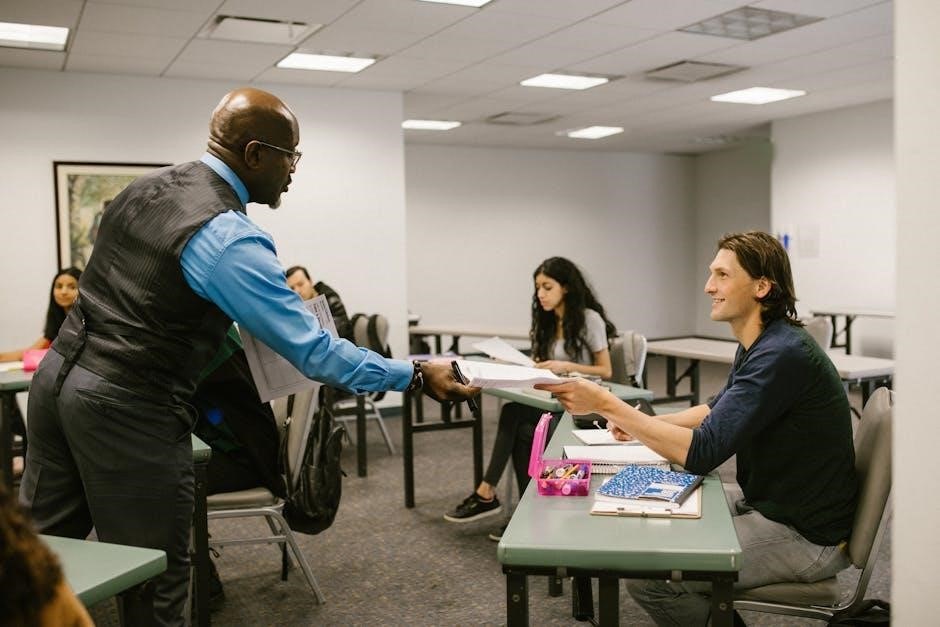firefighter exam study guide
Category : Guide

A comprehensive review of key subjects, including math, reading comprehension, and mechanical reasoning, is essential. Practice tests and study apps, like the IFSTA app, provide realistic exam simulations. Focus on understanding test formats and strategies to boost confidence and scores.
The firefighter exam is a critical step for those aspiring to join the fire service, assessing both knowledge and physical abilities. It is designed to evaluate cognitive skills, situational judgment, and mechanical aptitude, ensuring candidates are prepared for the demands of the job. The exam typically includes multiple phases, such as written tests, physical assessments, and oral interviews. Understanding the structure and content of the exam is vital for success. Candidates must demonstrate proficiency in areas like math, reading comprehension, and problem-solving. Additionally, the exam may include questions on fire safety, emergency procedures, and equipment operation. Preparation is key, as competition for positions is often intense. This guide provides insights and strategies to help candidates navigate the exam process effectively, ensuring they are well-prepared to achieve their goal of becoming a firefighter.
- Assesses cognitive and physical abilities.
- Covers topics like math, reading, and problem-solving.
- Includes multiple exam phases.

Understanding the Exam Format
The firefighter exam format varies by department but typically includes multiple-choice questions, reading comprehension, and mechanical reasoning. Candidates are often given a set number of questions to complete within a specific time frame. The exam may also assess situational judgment, presenting scenarios that test decision-making skills. Understanding the format is crucial for effective preparation, as it allows candidates to focus on the types of questions they will encounter. Additionally, some exams may include video-based simulations or oral interviews. Knowing the weight of each section can help prioritize study efforts. For example, math and reading comprehension are often heavily emphasized. Familiarizing oneself with the test format reduces anxiety and improves performance. Practice tests are an excellent way to gain insight into the exam structure and timing. By understanding the format, candidates can develop strategies to manage their time and approach each question confidently.
- Typically includes multiple-choice questions and reading comprehension.
- Assesses mechanical reasoning and situational judgment.
- Time management is critical due to the large number of questions.

Key Exam Subjects
The firefighter exam evaluates a range of critical skills and knowledge areas essential for the role. Key subjects include mathematics, reading comprehension, mechanical reasoning, and situational judgment. Math questions often involve basic arithmetic, algebra, and problem-solving related to firefighting scenarios, such as calculating water pressure or estimating distances. Reading comprehension tests the ability to interpret complex texts, including fire safety manuals and emergency procedures. Mechanical reasoning assesses understanding of tools, machinery, and physical principles, such as hydraulics and levers. Situational judgment questions present real-life fireground scenarios, requiring candidates to choose the most appropriate actions. These subjects are designed to ensure candidates possess the necessary cognitive and practical skills for the job. Additionally, some exams may include video-based simulations or oral interviews to evaluate communication and decision-making abilities. Mastering these subjects is vital for achieving a high score and advancing in the selection process.

- Mathematics: Basic arithmetic, algebra, and problem-solving.
- Reading Comprehension: Interpreting complex texts and procedures.
- Mechanical Reasoning: Understanding tools, machinery, and physical principles.
- Situational Judgment: Decision-making in emergency scenarios;
Effective Study Techniques
Success on the firefighter exam requires a structured and disciplined approach to studying. Active learning techniques, such as engaging with practice questions and flashcards, can enhance retention. Dedicate time to understanding each subject area, focusing on weaknesses. Utilize study guides like Firefighter Exam For Dummies and online resources, such as the IFSTA study app, to simulate real test conditions. Break study sessions into manageable chunks to avoid burnout and improve focus. Additionally, joining study groups or forums can provide valuable insights and tips from experienced candidates. Prioritize subjects that are heavily weighted on the exam, such as mechanical reasoning and situational judgment. Regularly review and analyze practice test results to identify patterns and areas for improvement. Consistency and organization are key to building confidence and mastery of the material. By combining these strategies, candidates can develop a robust study plan tailored to their needs.

- Engage with practice questions and flashcards.
- Utilize study guides and online resources.
- Break study sessions into manageable chunks.
- Join study groups or forums for support.
- Review and analyze practice test results.
Managing Test Anxiety
Test anxiety can significantly impact performance, but effective strategies can help mitigate it. Start by understanding the exam format and content to reduce unknowns. Practice tests and study guides, such as those mentioned in Firefighter Exam For Dummies, can familiarize you with the structure and timing. Develop a pre-test routine, such as deep breathing or visualization, to calm your mind. Stay physically active, as exercise reduces stress and improves focus. Ensure adequate sleep and nutrition to maintain mental clarity. During the test, manage time wisely, skipping difficult questions initially and returning to them later; Break tasks into smaller steps to avoid feeling overwhelmed. Positive self-talk and confidence in your preparation can also alleviate anxiety. Remember, preparation is key—knowing the material reduces fear of the unknown. By combining these strategies, you can approach the exam with calmness and confidence.
- Understand the exam format and content.
- Practice with study guides and mock tests.
- Develop a pre-test routine for calmness.
- Stay physically active and well-rested.
- Manage time effectively during the exam.
Physical Preparation

Physical fitness is a cornerstone of firefighter training and exams; Firefighters must possess strength, endurance, and agility to perform demanding tasks. Start with a structured workout plan focusing on cardiovascular health, muscle building, and flexibility. Incorporate exercises like weight training, running, and functional movements to simulate firefighting scenarios. Practice climbing stairs, carrying heavy objects, and wearing mock firefighter gear to build stamina. Proper nutrition and hydration are crucial to fuel your body for intense training. Rest and recovery are equally important to prevent injuries and maintain peak performance. Utilize resources like the IFSTA study app or practice guides to familiarize yourself with physical test formats. Many candidates also benefit from enrolling in firefighter-specific fitness programs or working with trainers experienced in this field. Consistency is key—aim to train regularly and gradually increase intensity to meet the rigorous demands of the job. A well-prepared body enhances both performance and confidence during the exam.

- Focus on strength, endurance, and agility.
- Incorporate cardiovascular and functional training.
- Simulate firefighting tasks in workouts.
- Prioritize nutrition, hydration, and rest.
- Use specialized resources for targeted preparation.
Utilizing Resources

Acquiring the right resources is vital for effective preparation. Books like Firefighter Exam For Dummies and the Encyclopedia of Firefighter Examinations provide in-depth insights and practice questions. The IFSTA study app offers realistic test simulations, helping you familiarize yourself with exam formats. Online platforms and forums connect you with experienced candidates, offering valuable tips and strategies. Additionally, preparation software for tests like the FST and NFSI can enhance your readiness; Utilize study guides that include solutions to sample questions to understand answer patterns. Many candidates also benefit from enrolling in prep courses or working with mentors who have successfully navigated the exam. Leveraging these tools ensures comprehensive preparation and boosts confidence. Always prioritize resources that align with your exam’s specific requirements, as they provide targeted practice and insights. Remember, consistent use of these materials can significantly improve your performance.
- Incorporate books and study guides for in-depth knowledge.
- Use apps and software for realistic practice.
- Engage with online communities for support.
- Consider enrolling in prep courses or seeking mentors.
Practice Tests and Feedback
Regularly taking practice tests is a cornerstone of effective exam preparation. These tests simulate real exam conditions, helping you assess your knowledge and identify weak areas. The IFSTA study app and other online platforms provide realistic simulations, closely mirroring the actual test format. After each practice test, review the feedback to understand where you went wrong. This process allows you to refine your strategies and focus on areas needing improvement. Many study guides, such as the Firefighter Exam For Dummies, include detailed explanations for each question, offering insights into correct and incorrect answers. Additionally, some resources provide scored results, helping you track your progress over time. Consistent practice not only builds confidence but also enhances your ability to manage time and reduce test anxiety. By incorporating practice tests into your study routine, you can ensure a well-rounded preparation for the exam.
- Take regular practice tests to simulate exam conditions.
- Review feedback to identify and address weaknesses.
- Use study guides with detailed question explanations.
- Track progress through scored practice tests.
Exam Day Strategies
On exam day, arrive early and well-rested to ensure a clear mind. Familiarize yourself with the test location beforehand to avoid last-minute stress. Bring all required documents and materials, such as identification and writing utensils. Read instructions carefully and manage your time effectively, allocating a set amount to each question. Skip difficult questions initially and return to them later to avoid wasting time. Stay calm and focused, avoiding distractions. If allowed, review your answers at the end to catch any errors. Utilize strategies learned from practice tests, such as eliminating incorrect answers to improve your chances of selecting the right one. Maintain a positive mindset and trust in your preparation. These tactics will help you perform at your best and maximize your score.
- Arrive early and prepared to the test location.
- Read instructions thoroughly before starting.
- Allocate time wisely for each question.
- Stay calm and avoid distractions.
Congratulations on completing this firefighter exam study guide! By now, you are well-equipped with the knowledge and strategies needed to excel on your exam and take the first step toward a rewarding career in firefighting. Remember, passing the exam is just the beginning. Once you’ve achieved this milestone, the next steps involve preparing for the fire academy and the physical demands of the job. Research the specific requirements of the fire department you’re applying to and ensure you meet all physical and procedural standards. Stay focused, persistent, and committed to your goal. Apply to multiple departments to increase your chances of selection, and consider gaining volunteer or intern experience to build your skills and network. Keep a positive attitude and continuously learn and grow. With dedication and hard work, you’ll succeed in this noble profession. Good luck on your journey to becoming a firefighter!
- Research department-specific requirements post-exam.
- Prepare physically and mentally for the fire academy.
- Apply to multiple departments to broaden opportunities.
- Stay persistent and maintain a positive mindset.
